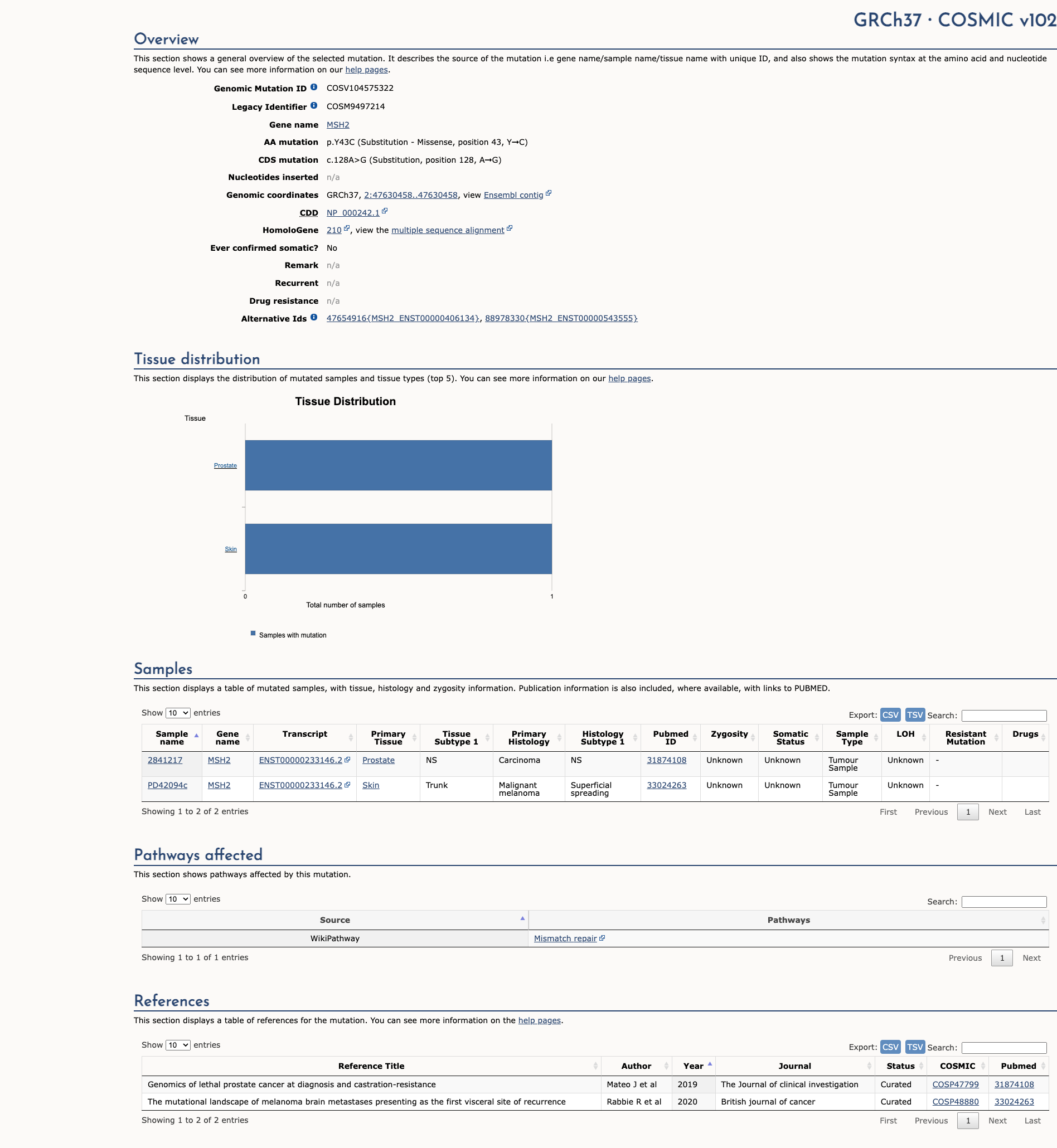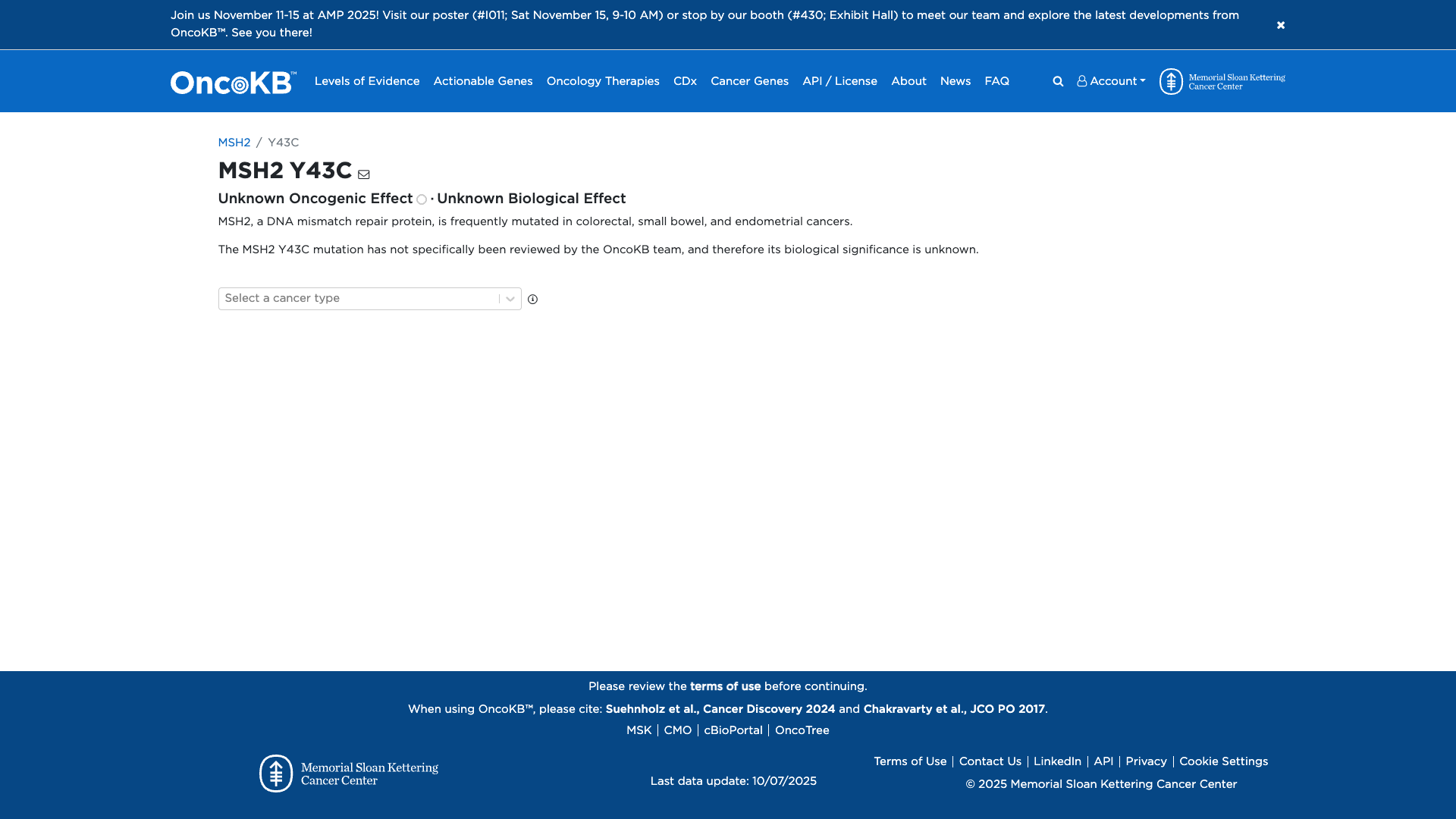MSH2 c.128A>G, p.Tyr43Cys
NM_000251.3:c.128A>G
COSMIC ID: COSM9497214
Variant of Uncertain Significance (VUS)
No ACMG/VCEP criteria are met for NM_000251.3:c.128A>G (p.Y43C) in MSH2 based on available data; classification remains Variant of Uncertain Significance.
ACMG/AMP Criteria Applied
No ACMG/AMP criteria definitively applied.
Genetic Information
Gene & Transcript Details
Gene
MSH2
Transcript
NM_000251.3
MANE Select
Total Exons
16
Strand
Forward (+)
Reference Sequence
NC_000002.11
Alternative Transcripts
| ID | Status | Details |
|---|---|---|
| NM_000251.2 | RefSeq Select | 16 exons | Forward |
| NM_000251.1 | Alternative | 16 exons | Forward |
Variant Details
HGVS Notation
NM_000251.3:c.128A>G
Protein Change
Y43C
Location
Exon 1
(Exon 1 of 16)
5'Exon Structure (16 total)3'
Functional Consequence
Loss of Function
Related Variants
ClinVar reports other pathogenic variants at position 43: Y43F
Alternate Identifiers
COSM9497214
Variant interpretation based on transcript NM_000251.3
Genome Browser
Loading genome browser...
HGVS InputNM_000251:c.128A>G
Active Tracks
ConservationRefSeqClinVargnomAD
Navigation tips: Use mouse to drag and zoom. Click on features for details.
Clinical Data
Global Frequency
0.00727%
Rare
Highest in Population
European (non-Finnish)
0.016%
Low Frequency
Global: 0.00727%
European (non-Finnish): 0.016%
0%
0.05%
0.1%
1%
5%
10%+
Allele Information
Total: 261262Alt: 19Homozygotes: 0
ACMG Criteria Applied
PM2
This variant is present in gnomAD (MAF= 0.00727%, 19/261262 alleles, homozygotes = 0) and at a higher frequency in the European (non-Finnish) population (MAF= 0.016%, 19/118526 alleles, homozygotes = 0). The variant is rare (MAF < 0.1%), supporting PM2 criterion application.
Classification
Unknown
Publications (0)
No publication details.
Clinical Statement
Functional Impact
Functional Domain
Hotspot Status
Not a hotspot
Domain Summary
This variant is not located in a mutational hotspot or critical domain (0 mutations).
Related Variants in This Domain
ClinVar reports other pathogenic variants at position 43: Y43F
PM5 criterion applied.
Computational Analysis
Pathogenicity Predictions
REVEL Score
0.875
0.875
Likely Benign0.0
Uncertain (Low)0.2
Uncertain (Med)0.5
Likely Pathogenic0.75
REVEL scores ≥ 0.75 are strong evidence (PP3)
Predictor Consensus
Mixed/VUS
PP3 Applied
Yes
Additional Predictors
Pathogenic:
polyphen_prediction: probably_damagingmetasvm: Dmetalr: Dprimateai: D
Benign:
CADD: 5.29
Neutral: Show all
VCEP Guidelines
Applied ACMG/AMP Criteria (VCEP Specific) VCEP Guidelines
PVS1
PVS1 (Not Applied) Strength Modified
According to VCEP guidelines, the rule for PVS1 is: "Very Strong Nonsense/frameshift variant introducing Premature Termination Codon (PTC) ≤ codon 891 in MSH2...". The evidence for this variant shows: Y43C is a missense change and does not introduce a premature stop codon or disrupt splicing. Therefore, this criterion is not applied because the variant does not meet the definition of a null variant.
PS1
PS1 (Not Applied) Strength Modified
According to VCEP guidelines, the rule for PS1 is: "Strong A predicted missense substitution that encodes the same amino acid change with a different underlying nucleotide change previously established by this VCEP as Pathogenic...". The evidence for this variant shows: NM_000251.3:c.128A>G results in Y43C, and there is no previously established pathogenic variant encoding Y43C via a different nucleotide change. Therefore, PS1 is not applied.
PS2
PS2 (Not Applied) Strength Modified
According to VCEP guidelines, the rule for PS2 is: "Very Strong ≥ 4 de novo points...". The evidence for this variant shows: no de novo data are available for this case. Therefore, PS2 is not applied.
PS3
PS3 (Not Applied) Strength Modified
According to VCEP guidelines, the rule for PS3 is: "Strong Calibrated functional assays with functional odds for Pathogenicity > 18.7...". The evidence for this variant shows: no functional studies have been performed on Y43C. Therefore, PS3 is not applied.
PS4
PS4 (Not Applied) Strength Modified
According to standard ACMG guidelines, the rule for PS4 is: "Prevalence of the variant in affected individuals is significantly increased compared with controls. Case–control data or significant segregation data required.". The evidence for this variant shows: no case–control or cohort data. Therefore, PS4 is not applied.
PM1
PM1 (Not Applied) Strength Modified
According to standard ACMG guidelines, the rule for PM1 is: "Located in a mutational hot spot and/or critical functional domain without benign variation.". The evidence for this variant shows: Y43C is not within a defined mutational hotspot or characterized functional domain. Therefore, PM1 is not applied.
PM2
PM2 (Not Applied) Strength Modified
According to VCEP guidelines, the rule for PM2 (Supporting) is: "Absent/extremely rare (<1 in 50,000 alleles) in gnomAD v4 dataset.". The evidence for this variant shows: MAF = 0.0000727 (1 in ~13,750 alleles), which is above the threshold of 1 in 50,000. Therefore, PM2 is not applied.
PM3
PM3 (Not Applied) Strength Modified
According to VCEP guidelines, the rule for PM3 is: "Very Strong: ≥ 4 points for detection in trans with a pathogenic variant in recessive disease.". The evidence for this variant shows: Lynch syndrome is autosomal dominant and no trans observations are reported. Therefore, PM3 is not applied.
PM4
PM4 (Not Applied) Strength Modified
According to standard ACMG guidelines, the rule for PM4 is: "Protein length changes due to in-frame deletions/insertions in a non-repeat region or stop-loss variants.". The evidence for this variant shows: Y43C is a missense change and does not alter protein length. Therefore, PM4 is not applied.
PM5
PM5 (Not Applied) Strength Modified
According to VCEP guidelines, the rule for PM5 (Moderate) is: "Missense change at an amino acid residue where a different missense change was classified by this VCEP as Pathogenic, only if PP3 is supporting.". The evidence for this variant shows: although other missense changes at Y43 exist, PP3 is not applied. Therefore, PM5 is not applied.
PM6
PM6 (Not Applied) Strength Modified
According to VCEP guidelines, the rule for PM6 (Supporting) is: "0.5 de novo points when parental testing is not confirmed.". The evidence for this variant shows: no de novo information is available. Therefore, PM6 is not applied.
PP1
PP1 (Not Applied) Strength Modified
According to VCEP guidelines, the rule for PP1 is: "Supporting/Moderate/Strong co-segregation thresholds based on Bayes LR values.". The evidence for this variant shows: no family segregation data are available. Therefore, PP1 is not applied.
PP2
PP2 (Not Applied) Strength Modified
According to standard ACMG guidelines, the rule for PP2 is: "Missense variant in a gene with a low rate of benign missense variation and where missense is a common mechanism of disease.". The evidence for this variant shows: MSH2 tolerates both missense and loss-of-function variants. Therefore, PP2 is not applied.
PP3
PP3 (Not Applied) Strength Modified
According to VCEP guidelines, the rule for PP3 (Moderate) is: "Missense variant with HCI prior probability for pathogenicity >0.81.". The evidence for this variant shows: HCI prior data are not available. Therefore, PP3 is not applied.
PP4
PP4 (Not Applied) Strength Modified
According to VCEP guidelines, the rule for PP4 (Supporting) is: "1 CRC/Endometrial MSI-H tumor with loss of MMR protein expression consistent with the variant location.". The evidence for this variant shows: no tumor or pathology data are provided. Therefore, PP4 is not applied.
PP5
PP5 (Not Applied) Strength Modified
According to standard ACMG guidelines, the rule for PP5 is: "Reputable source reports variant as pathogenic.". The evidence for this variant shows: no such reports in ClinVar or other databases. Therefore, PP5 is not applied.
BA1
BA1 (Not Applied) Strength Modified
According to VCEP guidelines, the rule for BA1 (Stand Alone) is: "GnomAD v4 Grpmax filtering allele frequency ≥ 0.001 (0.1%).". The evidence for this variant shows: MAF = 0.0000727, below threshold. Therefore, BA1 is not applied.
BS1
BS1 (Not Applied) Strength Modified
According to VCEP guidelines, the rule for BS1 (Strong) is: "GnomAD v4 Grpmax filtering allele frequency ≥ 0.0001 and < 0.001.". The evidence for this variant shows: MAF = 0.0000727, below threshold. Therefore, BS1 is not applied.
BS2
BS2 (Not Applied) Strength Modified
According to VCEP guidelines, the rule for BS2 (Strong) is: "Co-occurrence in trans with a known pathogenic variant in Lynch syndrome without CMMRD features.". The evidence for this variant shows: no co-occurrence data. Therefore, BS2 is not applied.
BS3
BS3 (Not Applied) Strength Modified
According to VCEP guidelines, the rule for BS3 (Strong) is: "Calibrated functional assays with functional odds for Pathogenicity ≤ 0.05 or synonymous/intronic with no mRNA aberration.". The evidence for this variant shows: no functional or splicing studies. Therefore, BS3 is not applied.
BS4
BS4 (Not Applied) Strength Modified
According to VCEP guidelines, the rule for BS4 (Strong) is: "Lack of co-segregation with disease (Bayes LR <0.05).". The evidence for this variant shows: no segregation data. Therefore, BS4 is not applied.
BP1
BP1 (Not Applied) Strength Modified
According to standard ACMG guidelines, the rule for BP1 is: "Missense in a gene where only LoF causes disease.". The evidence for this variant shows: MSH2 disease mechanism includes both missense and truncating variants. Therefore, BP1 is not applied.
BP2
BP2 (Not Applied) Strength Modified
According to standard ACMG guidelines, the rule for BP2 is: "Observed in trans with a pathogenic variant for a fully penetrant dominant disorder.". The evidence for this variant shows: no such trans observations. Therefore, BP2 is not applied.
BP3
BP3 (Not Applied) Strength Modified
According to standard ACMG guidelines, the rule for BP3 is: "In-frame indels in repetitive region without known function.". The evidence for this variant shows: Y43C is a missense substitute, not an indel. Therefore, BP3 is not applied.
BP4
BP4 (Not Applied) Strength Modified
According to VCEP guidelines, the rule for BP4 (Supporting) is: "Missense variant with HCI-prior probability <0.11 or intronic/synonymous with SpliceAI delta ≤0.1.". The evidence for this variant shows: it is a missense variant and HCI prior is unavailable. Therefore, BP4 is not applied.
BP5
BP5 (Not Applied) Strength Modified
According to VCEP guidelines, the rule for BP5 (Strong) is: "Multiple tumors inconsistent with Lynch syndrome phenotype.". The evidence for this variant shows: no tumor phenotype data. Therefore, BP5 is not applied.
BP6
BP6 (Not Applied) Strength Modified
According to standard ACMG guidelines, the rule for BP6 is: "Reputable source reports variant as benign.". The evidence for this variant shows: no such reports. Therefore, BP6 is not applied.
BP7
BP7 (Not Applied) Strength Modified
According to VCEP guidelines, the rule for BP7 (Supporting) is: "A synonymous or intronic variant at or beyond -21/+7 without splicing impact.". The evidence for this variant shows: Y43C is a missense change. Therefore, BP7 is not applied.



